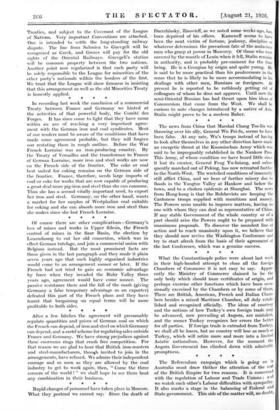In recording last week the conclusion of a commercial Treaty
between France and Germany we hinted at the activities of that powerful body, the Comite des Forges. It has since come to light that they have come within an ace of reaching a very important agree- ment with the German iron and coal syndicates. Most of our readers must be aware of the conditions that have made some agreement probable, but they will forgive our restating them in rough outline. Before the War French Lorraine was an iron-producing country. By the Treaty of Versailles and the transference to France of German Lorraine, more iron and steel works are now on the French side of the frontier. The coke or coal best suited for coking remains on the German side of the frontier. France, therefore, needs large imports of coal or coke for works that are now capable of producing a great deal more pig-iron and steel than she can consume. Thus she has a second vitally important need, to export her iron and steel. Germany, on the other hand, wants a market for her surplus of Westphalian coal suitable for coking and she can absorb more iron and steel than she makes since she lost French Lorraine.


































 Previous page
Previous page